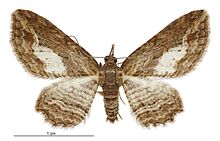Chloroclystis filata
| Chloroclystis filata | |
|---|---|

| |
| Male specimen | |

| |
| Female specimen | |
| Scientific classification | |
| Domain: | Eukaryota |
| Kingdom: | Animalia |
| Phylum: | Arthropoda |
| Class: | Insecta |
| Order: | Lepidoptera |
| Family: | Geometridae |
| Genus: | Chloroclystis |
| Species: | C. filata
|
| Binomial name | |
| Chloroclystis filata | |
| Synonyms | |
| |
Chloroclystis filata, the Australian pug moth, is a species of moth of the family Geometridae.[2] It is native to Australia and is found in the south eastern quarter of Australia and on Norfolk Island. It self introduced itself to New Zealand in 1960. In Australia host plants are acacias (the blossoms) and Fabaceae (the petals).
Taxonomy
[edit]This species was first described by Achille Guenée in 1857 and originally named Eupithecia filata.[3] In 1958 L. B. Prout discussed this species under the name Chloroclystis albiplaga as an aberation of filata.[4] The placement of this species in the genus Chloroclystis is in doubt. As a result, this species has also been referred to as Chloroclystis (s.l.) filata.[5] The male holotype specimen is held at the Natural History Museum, London.[4]
Description
[edit]
This species has a wingspan of between 20 to 25 mm.[6] It is has forewings that are brownish in colour. This species is variable with some specimens having the whole of their forewing being brown, pinkish brown or a black shade.[7] Other specimens of this species have large white patches in the middle to lower portion of their forewings.[6][7] This species can be distinguished from other species with a similar appearance as it has a dark brown band across the hindwings.[6] The hindwings of this species are notched which assists with distinguishing this species from the brown coloured specimens of Chloroclystis inductata.[7]
Distribution
[edit]This species is native to Australia where it is found in the south eastern parts of that country as well as Norfolk Island. This species was introduced to New Zealand in 1960 and is found throughout the country.[4][6] It is regarded as being very common in New Zealand.[7]
Habitat and hosts
[edit]The larvae of this species feed on the flowers of shrubs. In Australia host plants are in the genus Acacia (the blossoms) and species in the genus Fabaceae (the petals).[8] In New Zealand have been observed feeding on the flowers of gorse and Senecio species.[9][6]
Behaviour
[edit]This species likely pupates on the ground.[7] In New Zealand this species is on the wing through out the year.[9] They are nocturnal and are attracted to light.[7]
Reference
[edit]- ^ Yu, Dicky Sick Ki. "Chloroclystis filata (Guenee 1857)". Home of Ichneumonoidea. Taxapad. Archived from the original on 25 March 2016. Retrieved 25 January 2017.
- ^ "Chloroclystis filata (Gueneeb, 1857)". New Zealand Organisms Register. Landcare Research New Zealand Ltd. Retrieved 25 January 2017.
- ^ Guenée, A. (1857). Histoire naturelle des insectes. Spécies général des lépidoptères [Natural history of insects. General species of Lepidoptera.] (in French). Vol. 10. Paris: Roret. p. 353.
{{cite book}}: CS1 maint: date and year (link) - ^ a b c Dugdale , J. S. (23 September 1988). "Lepidoptera - annotated catalogue, and keys to family-group taxa". Fauna of New Zealand. 14. Department of Scientific and Industrial Research: 1–264. doi:10.7931/J2/FNZ.14. ISSN 0111-5383. Wikidata Q45083134.
- ^ Gordon, Dennis P., ed. (2010). New Zealand inventory of biodiversity: Kingdom animalia: chaetognatha, ecdysozoa, ichnofossils. Vol. 2. p. 459. ISBN 978-1-877257-93-3. OCLC 973607714. OL 25288394M. Wikidata Q45922947.
- ^ a b c d e Carey Knox (2024). Butterflies & Moths of Aotearoa New Zealand. John Beaufoy Publishing. p. 46. ISBN 978-1-913679-66-8. Wikidata Q130640046.
- ^ a b c d e f Robert Hoare (2014). A Photographic Guide to Moths & Butterflies of New Zealand. Illustrator: Olivier Jean-Philippe Ball. p. 91. ISBN 978-1-86966-399-5. Wikidata Q59396160.
- ^ "Common Moths of the Adelaide Region - Sheet 1" (PDF). Butterfly Conservation South Australia. Archived from the original (PDF) on 23 March 2018. Retrieved 8 May 2018.
- ^ a b Andrew Crowe (2002), Which New Zealand Insect?, Auckland: Penguin Books, p. 21, Wikidata Q120878300
